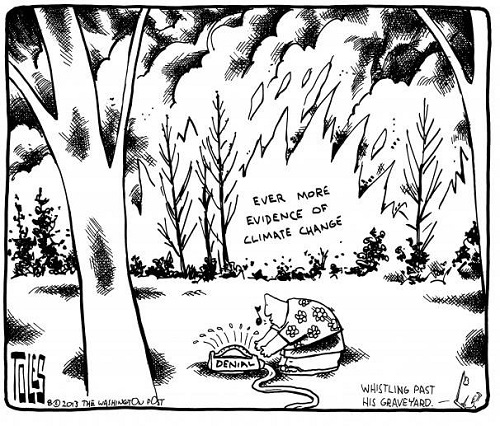2014 SkS Weekly Digest #31
Posted on 3 August 2014 by John Hartz
SkS Highlights
State Department cuts through the acid political environment on oceans and climate, by Sarah highlighted the Our Ocean conference hosted by the U.S. Secretary of State, John Kerry, in June. The conference enlisted international policy makers, scientists, and the private sector to take action to ensure a healthy ocean for the future. Sarah's article drew the most comments of the articles posted on SkS during the past week.
El Niño Watch
"As predicted earlier in the year, any chance for a 'super El Niño' to develop this winter has faded over time, and the latest word is that the pattern seems to be settling onto a course towards a weak El Niño by year's end. However, what's developing in the equatorial Pacific Ocean now is not exactly what forecasters typically see in this kind of situation, and it could result in some very interesting and unexpected weather in the coming seasons."
While a 'super' El Niño looks to be off the table, what does develop this year might not deliver what many Canadians are hoping for by Scott Sutherland, Meteorologist, The Weather Network, July 30, 3024
Toon of the Week

h/t to I heart Climate Scientists
Quote of the Week
"Recent satellite observations have confirmed the accuracy of two independent computer simulations that show that the West Antarctic ice sheet has now entered a state of unstoppable collapse. The planet has entered a new era of irreversible consequences from climate change. The only question now is whether we will do enough to prevent similar developments elsewhere.
"What the latest findings demonstrate is that crucial parts of the world’s climate system, though massive in size, are so fragile that they can be irremediably disrupted by human activity. It is inevitable that the warmer the world gets, the greater the risk that other parts of the Antarctic will reach a similar tipping point; in fact, we now know that the Wilkes Basin in East Antarctica, as big or even bigger than the ice sheet in the West, could be similarly vulnerable.
"There are not many human activities whose impact can reasonably be predicted decades, centuries, or even millennia in advance. The fallout from nuclear waste is one; humans’ contribution to global warming through greenhouse gas emissions from burning fossil fuels, and its impact on rising sea levels, is another.
"Indeed, the latest Intergovernmental Panel on Climate Change (IPCC) report stated, in uncharacteristically strong terms, that the sea level is “virtually certain” to continue to rise in the coming centuries or millennia. Moreover, the greater our emissions, the higher the seas will rise."
How Antarctica shows we're at the point of no return by Anders Levermann*, World Economic Forum/Project Syndicate, July 28, 2014
*Anders Levermann is a climate scientist at the Potsdam Institute for Climate Impact Research, and Professor of the Dynamics of the Climate System at the Institute for Physics and Astrophysics, Potsdam University, Germany.
SkS in the News
Quantifying the consensus on anthropogenic global warming in the scientific literature, Cook et al, 2013, Environmental Research Letters, is referenced in:
- Shattering Myths to Help the Climate, Op-ed by Robert H. Frank, The Upshot/New York Times, Aug 2, 2014
- How to Change Minds About Our Changing Climate: Let Science Do the Talking the Next Time Someone Tries to Tell You... by Seth B. Darling and Douglas L. Sisterson, The Experiment LLC, New York, July, 2014
SkS Spotlights

The Global Climate and Health Alliance was formed in Durban in 2011 to tackle climate change and to protect and promote public health.
The Alliance consists of health organizations from around the world united by a shared vision for a sustainable future. Specifically the Alliance members work together to:
- Ensure health impacts are integrated into global, national and local responses to climate change
- Encourage the health sector to mitigate and adapt for climate change
The Alliance does this through:
- Providing leadership
- Advocating for health and climate
- Policy and research
- Engaging and informing
The Alliance was launched following the inaugural Climate and Health summit, which took place during the 17th Conference of the Parties (COP17)* to the United Nations Framework Convention on Climate Change (UNFCCC).
Alliance members meet annually at the conference of the UN Framework Convention on Climate Change.
*The COP 17 took place from 28 Nov to 9 Dec, 2011 in Durban, South Africa.
Poster of the Week

SkS Week in Review
- 2014 SkS Weekly News Roundup #31B by John Hartz
- Error identified in satellite record may have overestimated Antarctic sea ice expansion by John Abraham
- Sen Whitehouse Schools Sen Inhofe about Global Warming on the Senate Floor by Dana
- 2014 SkS Weekly News Roundup #31A by John Hartz
- New Zealand’s Southern Alps have lost a third of their ice by Jim Salinger, Blair Fitzharris, and Trevor Chinn, The Conversation
- State Department cuts through the acid political environment on oceans and climate by Sarah
- Nigel Lawson suggests he's not a skeptic, proceeds to deny global warming by Dana
Coming Soon on SkS
- Harvard historian: strategy of climate science denial groups 'extremely successful' (Graham Readfearn)
- A Relentless Rise in Global Sea Level (Rob Painting)
- New study finds fringe global warming contrarians get disproportionate media attention (Dana)
- Scientists lambast The Australian for misleading article on deep ocean cooling (Roz Pidcock)
- Air pollution and climate change could mean 50 per cent more people going hungry by 2050, new study finds (Roz Pidcock)
- 2014 SkS Weekly News Roundup #32 (John Hartz)































 Arguments
Arguments






























Comments